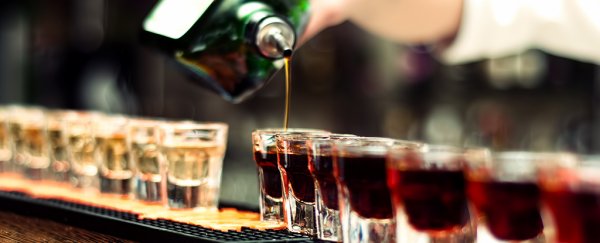For decades, tobacco companies have been accused of engaging in dodgy tactics that actively misrepresent the science on health risks associated with their products.
But they're not the only ones. New research has identified similar examples of obfuscation and denial being promoted by alcohol industry groups, putting a spotlight on how policy makers and the public should access accurate information on safe and responsible drinking.
The study conducted by London School of Hygiene and Tropical Medicine in the UK consists of a survey of websites and documents from 27 bodies that represent or are closely associated with companies that produce and distribute alcoholic beverages.
Nearly all of the websites evaluated showed some kind of misrepresentation of the evidence on alcohol-related cancer risk, especially when it came to breast and colorectal cancers.
"The weight of scientific evidence is clear - drinking alcohol increases the risk of some of the most common forms of cancer, including several common cancers," says lead researcher Mark Petticrew.
"Public awareness of this risk is low, and it has been argued that greater public awareness, particularly of the risk of breast cancer, poses a significant threat to the alcohol industry."
The public can be forgiven for being confused.
While the latest research claims just a standard drink a day can increase the risk of breast cancer, it seems as if nearly every other day there is a new piece of research on how our diet and activity affects our health.
Health organisations targeting specific conditions might provide a good summary of the latest science, but it's rare we'd seek out information until we have a personal reason to do so, such as when it's too late to make changes.
It's in this confusion over authority and ongoing developments in research that companies find room to put risk into a more favourable light.
"Existing evidence of strategies employed by the alcohol industry suggests that this may not be a matter of simple error," says Petticrew.
The most common strategy the research identified was to present the links between alcohol consumption and cancer risk as highly complex, implying any evidence of a direct correlation is weak or non-existent.
The researchers also found clear examples of denial, misrepresenting the risks of moderate drinking, or establishing misdirection by describing other, non-alcohol related risk factors.
It's hardly news that for all of its perks, the human brain isn't great at managing personal risk based on probabilities.
This can make a strategy of 'deny-distort-distract' even more tempting when it comes to selling a product.
"Contesting the research evidence base is often part of the stakeholder marketing strategy of the alcohol industry," says Ross Gordon, President of the Australian Association of Social Marketing, who wasn't involved in the research.
"This has parallels with the tobacco industry who contested the links between smoking and cancer for years."
So-called "Big Tobacco" has been a case study for how companies protect their products against risk-aversion by publically challenging the science.
Other industries, such as sugar, have also faced similar accusations over the years.
This isn't even the first time the alcohol industry has come under scrutiny, with similar studies in previous years finding evidence in confidential documents that health concerns were a potential threat to sales, and had to be dealt with.
While it might not exactly be a shocking revelation, it does serve as a timely reminder for the public and policy makers to consider how to think critically about where they get their information from.
The fact the alcohol industry doesn't flatly deny health consequences seems to go in their favour.
"It has often been assumed that, by and large, the AI (Alcohol Industry), unlike the tobacco industry, has tended not to deny the harms of alcohol," says Petticrew.
"However, through its provision of misleading information it can maintain what has been called 'the illusion of righteousness' in the eyes of policymakers, while negating any significant impact on alcohol consumption and profits."
It's important to note this study isn't making any claim on safe limits of alcohol consumption, or advising the public not to drink.
Drinking within recommended guidelines means it's a safe bet that you won't be significantly affecting your risk of getting breast or colorectal cancer.
The research was also limited to few forms of public communication, failing to take into account social media for example.
But it's highly questionable that the message would be all that different. And where public health bodies and the average drinker could be influenced by industry media, there's a cause to pause.
"Our findings are also a clear reminder of the risks of giving the AI the responsibility of informing the public about alcohol and health," says Petticrew.
This research was published in Drug and Alcohol Review.
